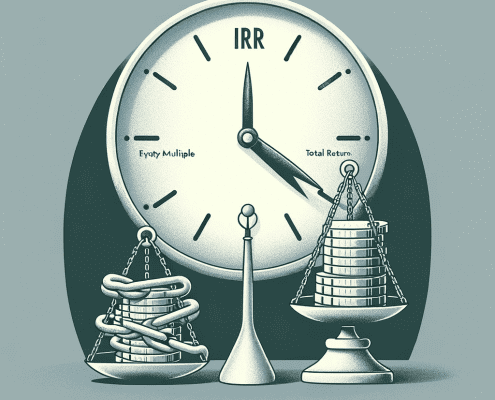
Real Estate Financial Modeling Accelerator (Updated January 2026)
Before launching the Accelerator program, Michael and I received countless emails requesting a more structured, step-by-step real estate financial modeling training program.
Over the years, we've covered hundreds of real estate modeling…

The Real Estate Site Visit Checklist: What to Look For and Other Thoughts
In our business, initial assessments are most often made from a distance. We rely on Google Maps satellite images, broker packages, demographic reports, street view, and more to evaluate a multi-million-dollar property. And these assessments…

Understanding Stabilization Through The Lens Of Operating Expense Ratio
The term “stabilized” is deeply embedded in the language of real estate. It shows up frequently in financial models, offering memoranda, development strategies, and underwriting assumptions. So frequently, in fact, that its meaning is often…

30/360, Actual/365, and Actual/360 – How Lenders Calculate Interest on CRE Loans – Some Important Insights (Updated July 2025)
(Updated August 7, 2019 to include a Watch Me Build video and Downloadable file)
Commercial real estate lenders commonly calculate loans in three ways: 30/360, Actual/365 (aka 365/365), and Actual/360 (aka 365/360). Real estate professionals…

A.CRE 101: How To Use The Discounted Cash Flow (DCF) Method To Value Income Producing Property (Updated Aug 2024)
The Discounted Cash Flow Method is a method to value a project by taking all future projected cash flows of the project and discounting them back to time zero (date of purchase) using a predetermined discount rate (the discount rate when used…

Analyzing Value-Add Investments in Real Estate Using Yield-on-Cost (Updated Aug 2024)
So a question recently came in around why a commercial real estate investor would use the Yield-on-Cost metric to assess a value-add real estate investment. This question came on the heals of several other questions also related to development…

Using the Cash-on-Cash Return in Real Estate Investment Analysis (Updated Aug 2024)
I’ve fielded a handful of Cash-on-Cash (CoC) return questions of late. So, I thought it would be worthwhile to write a post on what the Cash-on-Cash return metric tells me about a potential real estate investment. This article is a primer,…

How to Use Debt Yield to Calculate Loan Amount (Updated July 2024)
In our glossary of commercial real estate terms, we recently answered the question: what is debt yield? As a follow up to that entry, I thought I’d expand on the concept of debt yield by showing you how lenders use debt yield to come up with…

Understanding Low-Income Housing Tax Credit (LIHTC) Investments
In this article, we explore Low-Income Housing Tax Credit (LIHTC) investments, a key component in the affordable housing sector. Established to encourage private investment, the LIHTC program offers tax credits to developers for creating and…

Underwriting a Tenant with Private Credit (Updated June 2024)
Recently, we had an Accelerator member ask a question about how to accurately determine a credit rating and spec income discount rate for a private tenant in a single tenant net lease deal. While the scenario specifically involved a medical…

Quick Thoughts on Evaluating Real Estate Investments Without Opening Excel
In our industry (commercial real estate), the ability to quickly evaluate investment opportunities is crucial for staying competitive. I know I've found in my professional career, that having a clear framework for evaluating - and then either…

Forecasting After-Tax Cash Flow in Real Estate Analysis (Updated May 2024)
When modeling real estate investments, industry practice is generally to stop at before-tax cash flow, rather than after-tax cash flow. And this makes sense in most instances. No two owners of real estate have the exact same tax situation and…

Using Geometric Mean (or CAGR) as an Alternative to IRR (Updated May 2024)
The internal rate of return (IRR) and compound annual growth rate (CAGR) are both metrics used to analyze investment returns. They're both commonly used in commercial real estate financial modeling, but what's the difference? When should you…

Terminology Guide for Build-to-Rent Investment
We recently released a Build-to-Rent (BTR) Development model to help students and developers better analyze this emerging investment type in commercial real estate. As we explored this type of analysis, it became clear that terminology is often…

Modeling a Property Tax Abatement in Real Estate (Updated Jan 2024)
We often field questions about how to model property tax abatements. It's a concept we cover in our the 'Advanced Modeling - Property and Portfolio' endorsement in our Accelerator real estate financial modeling training program and something…

Limitations of IRR When Evaluating Real Estate Investments
The internal rate of return is one of the most commonly used return metrics to analyze real estate investment opportunities. Simply put, the IRR is the anticipated, project-determined discount rate an investor is expected to earn over the life…

